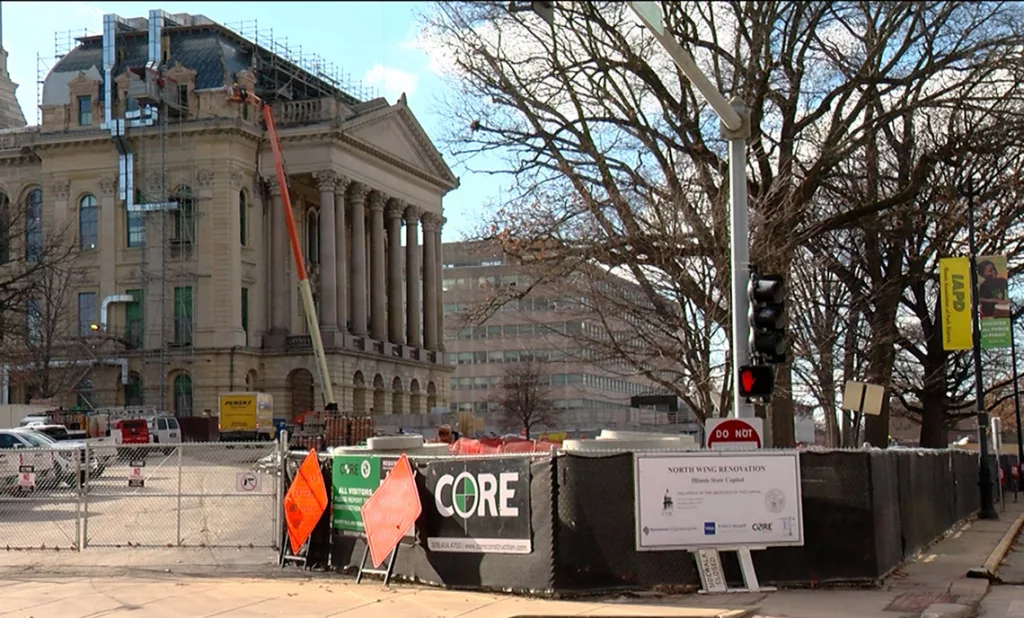
By PETER HANCOCK
Capitol News Illinois
phancock@capitolnewsillinois.com
SPRINGFIELD – Visitors coming to the Illinois Statehouse to see their lawmakers in action, or just to tour the historic building, may see longer lines to get through security screening during the upcoming legislative sessions.
Responding to a significant increase in potential threats to lawmakers and the public in recent years, Secretary of State Alexi Giannoulias’s office recently implemented new, emergency rules requiring nearly anyone to pass through security screening upon entering the Statehouse or any building in the Illinois Capitol Complex.
“Unfortunately, the world is not getting safer,” Amy Williams, senior legal advisor in the secretary of state’s office, told a legislative oversight committee Tuesday.
One of the more serious threats, Williams said, occurred in March when security officials were notified of an active shooter threat, prompting a lockdown of the complex. The lockdown was lifted after investigators determined there was no credible threat, according to reports at the time.
In April, police locked down the Capitol for about an hour as the building was cleared following a bomb threat. Illinois State Police arrested a suspect accused of making the threat the following month.
So far in 2024, Williams told the committee, the Secretary of State Police Department has responded to 17 threats to the Capitol, nearly twice as many as any other year since 2018.
There have also been threats directed at individual lawmakers. In September, a man was arrested for threatening to assassinate Rep. Jeff Keicher, R-Sycamore.
And on Monday, Dec. 9, Rep. Barbara Hernandez, D-Aurora, reported an employee in her district office became ill after opening office mail, according to a social media post. The employee was transported to a local hospital, prompting police to evacuate the building and cordon off a portion of the street while emergency crews responded.
In October, Williams said, the secretary of state’s office was advised by a security consultant to increase the number of people required to go through security screening to include everyone other than lawmakers, state government employees and other elected officials.
That meant many people who had previously been given unrestricted access to the building – including lobbyists, vendors and members of the news media – now have to go through security screening as well.
“Primarily that decision came about because members of the General Assembly, elected officials, are sensibly background checked by their constituents who choose them to go to the Capitol to do the people’s work on their behalf,” she said. “And state government employees are background checked by their respective agencies. Lobbyists, vendors and members of the press are not subject to any background check.”
To avoid congestion, Williams said the office has set up a “TSA Express-style” screening point at the east entrance of the building for those individuals who previously had unfettered access.
The security changes near the tail end of a three-year, $224 million renovation project that will make permanent changes to the way the public enters and exits the Capitol.
That project involves restoration and remodeling of the entire north wing of the Capitol. When it’s completed, sometime in 2025, all public access will be through a new entryway on the north side of the building where people will pass through security screening before entering the building itself.
Until then, visitors will continue entering through either the east or west doors of the building where metal detectors and baggage x-ray machines are located just inside the building.
Lawmakers are tentatively scheduled to return to the Statehouse Jan. 2 for the start of a brief lame duck session. The regular 2025 session begins Wednesday, Jan. 8.
Capitol News Illinois is a nonprofit, nonpartisan news service that distributes state government coverage to hundreds of news outlets statewide. It is funded primarily by the Illinois Press Foundation and the Robert R. McCormick Foundation.
